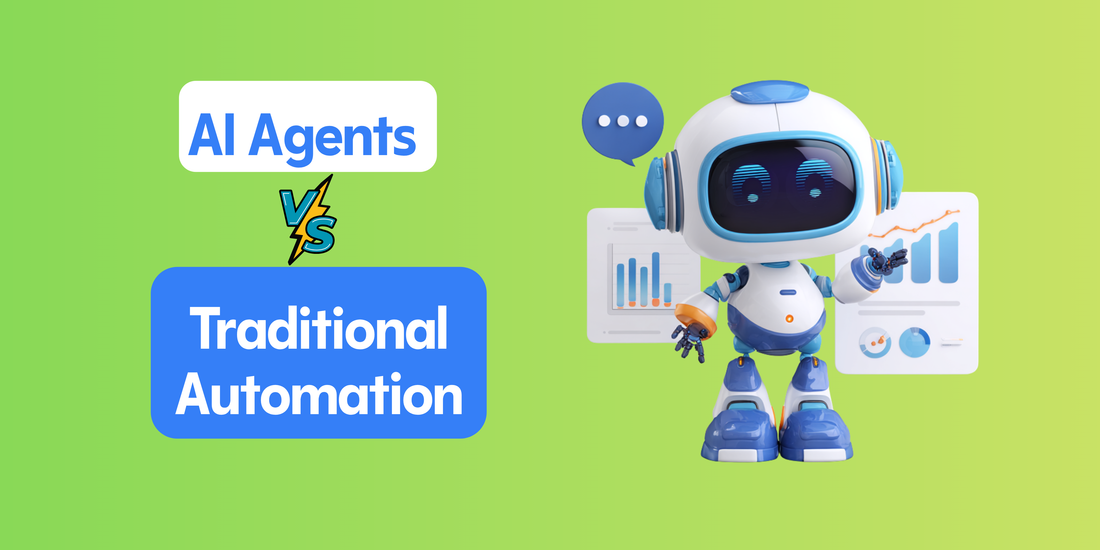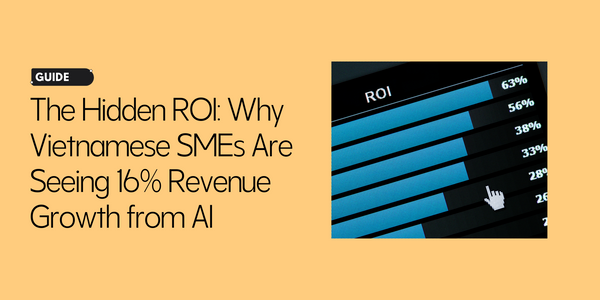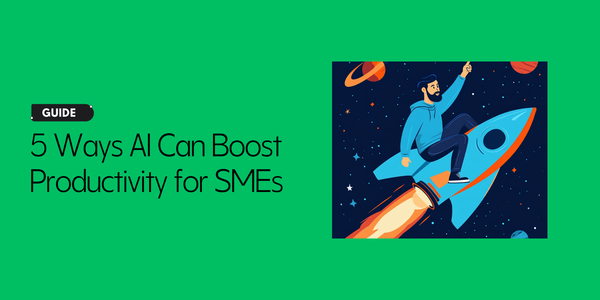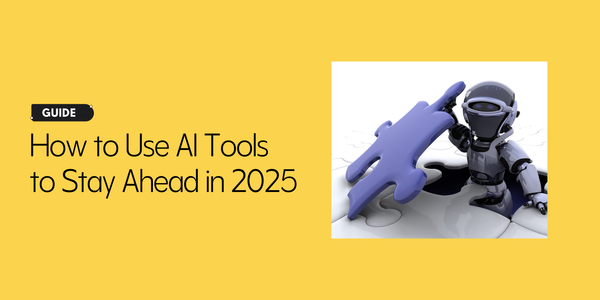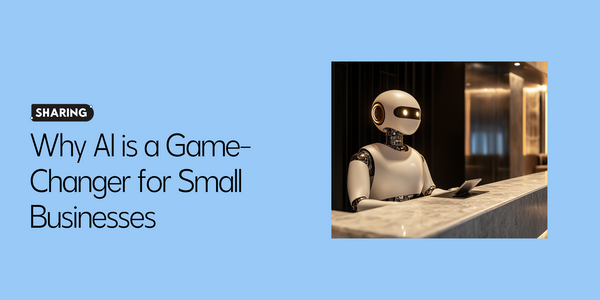Did you know that 61% of Vietnamese businesses using AI reported an average revenue increase of 16%? But here's what most don't realize: the game-changing shift isn't just about adopting AI—it's about evolving from rigid traditional automation to intelligent AI agents that can think, learn, and adapt in real-time.
Picture this: instead of scrambling to reprogram your automation systems every time market conditions change, you have intelligent agents that automatically adapt, learn from new situations, and optimize themselves. For Vietnamese enterprises racing to stay competitive in 2025, this isn't just an upgrade—it's a strategic necessity.

Vietnamese enterprises are rapidly transitioning from traditional automation to intelligent AI agents
The AI agent market is exploding at a 45.8% compound annual growth rate, projected to reach $47 billion by 2030. Meanwhile, Vietnamese businesses are leading Southeast Asia's AI adoption surge, with 39% year-on-year growth. But what's driving this massive shift from traditional automation to AI agents? The answer lies in understanding the fundamental differences and why smart Vietnamese enterprises are making the switch now.
1. The Great Automation Evolution: From Scripts to Intelligence
Traditional automation has served Vietnamese businesses well for decades. Like a factory assembly line, it excels at executing predefined tasks with precision and speed. But in today's rapidly changing market conditions—especially post-pandemic business realities—rigid, rule-based systems are showing their limitations.
Traditional Automation: The Digital Assembly Line
- Rule-based execution: Follows predetermined workflows exactly as programmed, perfect for predictable, repetitive tasks like invoice processing or data entry.
- High efficiency for routine work: Processes thousands of transactions without fatigue, reducing manual labor costs and human errors in standardized operations.
- Rigid structure: Requires manual reprogramming when business rules change, creating bottlenecks and maintenance overhead that can be costly for growing enterprises.
Vietnam Reality Check
A Hanoi-based logistics company found their traditional automation system broke down 12 times in 2024 due to changing customs regulations, costing them 180 hours of manual reprogramming and $15,000 in lost efficiency.
AI Agents: The Intelligent Workforce
- Goal-oriented thinking: AI agents understand objectives and find the best path to achieve them, adapting to obstacles and changing conditions without human intervention.
- Continuous learning: Improve performance over time by analyzing outcomes and adjusting strategies, becoming more efficient and accurate with every interaction.
- Context awareness: Process unstructured data like emails, documents, and conversations, making decisions based on nuanced understanding rather than rigid rules.
Success Story: FPT Corporation deployed AI agents for customer service and saw 40% faster resolution times while handling 3x more complex queries than their previous rule-based system.
2. The Business Case: Why Vietnamese Enterprises Are Switching
The shift from traditional automation to AI agents isn't just a technology upgrade—it's a strategic business transformation driven by measurable ROI and competitive advantages that Vietnamese companies can't afford to ignore.
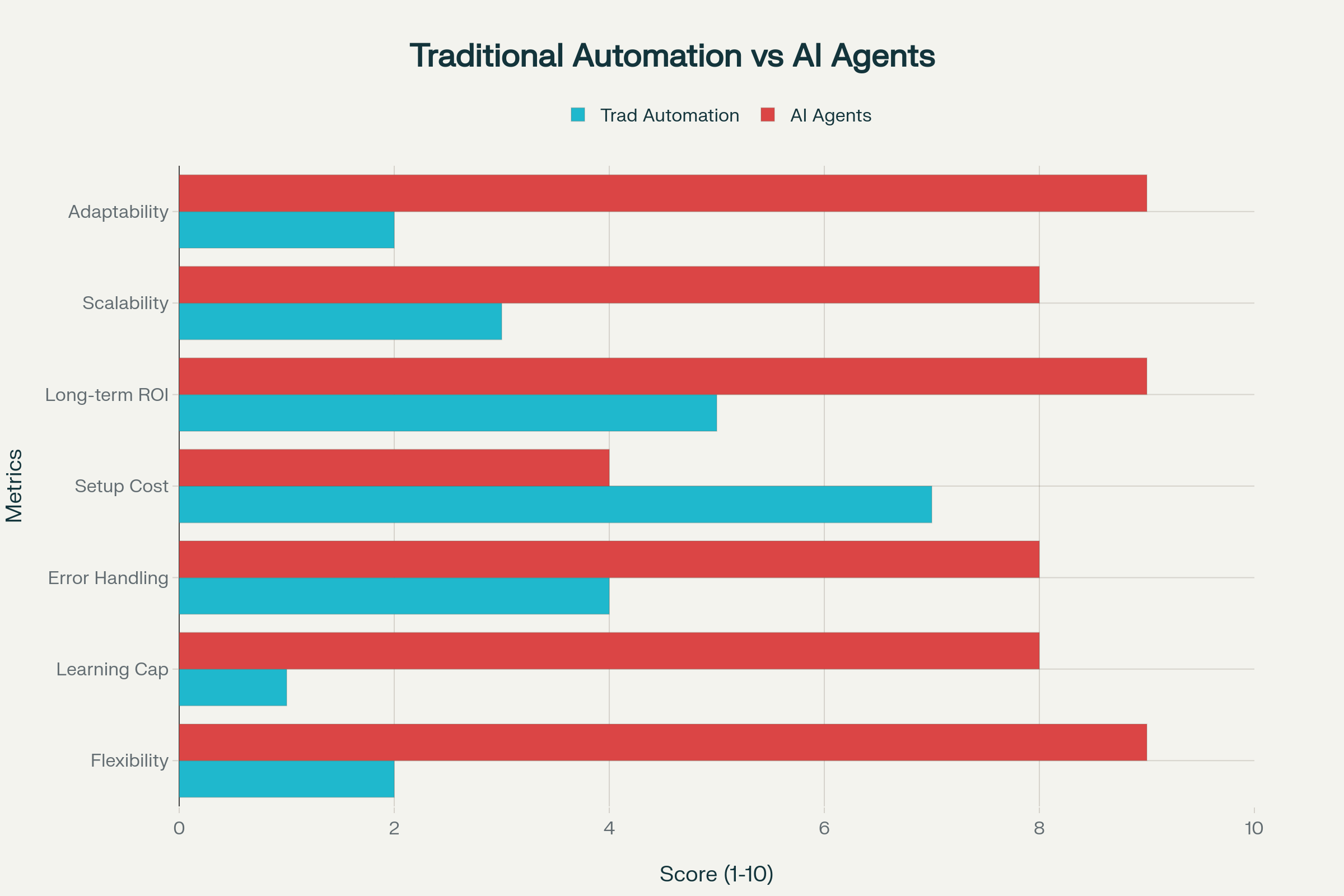
Performance comparison showing AI agents' superiority in key business metrics
Financial Impact: The Numbers Don't Lie
- ROI Acceleration: Organizations report 3x to 6x returns on AI agent investments within the first year, compared to traditional automation's plateau effect after initial deployment.
- Cost Reduction: Vietnamese businesses using AI agents report average cost savings of 20%, with some achieving up to 40% reduction in operational expenses.
- Revenue Growth: 61% of Vietnamese businesses with AI agents reported average revenue increases of 16%, significantly outperforming traditional automation users.
Competitive Advantage
While 74% of Vietnamese businesses still use basic automation, forward-thinking enterprises implementing AI agents are capturing disproportionate market share. The early mover advantage is significant—companies switching now report being 18 months ahead of competitors.
Operational Excellence
- Scalability Without Linear Costs: AI agents handle 10x more workload without proportional cost increases, perfect for Vietnam's rapidly growing market.
- Exception Handling: While traditional automation fails when encountering unexpected scenarios, AI agents adapt and resolve 80% of exceptions automatically.
Real Impact: Vietcombank's AI agents process loan applications 60% faster than their previous system, while simultaneously improving approval accuracy by 25%.
3. Practical Applications: Where Vietnamese Businesses Are Seeing Success
Vietnamese enterprises across industries are successfully implementing AI agents in specific use cases that deliver immediate value while building foundation for future growth.
Customer Service Revolution
- 24/7 Intelligent Support: AI agents handle customer inquiries in Vietnamese, English, and other languages, providing contextual responses that go beyond scripted answers.
- Sentiment Analysis: Detect customer emotions and escalate appropriately, turning potentially negative experiences into positive outcomes before human agents even get involved.
Success Metric
Shopee Vietnam's AI customer service agents resolve 70% of inquiries without human intervention, while achieving 95% customer satisfaction scores—higher than their previous human-only team.
Supply Chain Intelligence
- Predictive Logistics: AI agents forecast demand fluctuations, optimize inventory levels, and automatically adjust supplier orders based on market trends and seasonal patterns.
- Risk Management: Monitor global supply chain disruptions and proactively suggest alternative suppliers or routes before problems impact operations.
Financial Operations
- Intelligent Processing: Handle complex financial documents, detect anomalies, and ensure compliance while reducing processing time from days to hours.
- Fraud Detection: Analyze transaction patterns in real-time, identifying suspicious activities with 94% accuracy while minimizing false positives.
Industry Example: Techcombank's AI agents process 85% of routine banking transactions autonomously, freeing human staff for complex customer advisory roles and new business development.
4. The Implementation Strategy: Making the Switch
Successful transition from traditional automation to AI agents requires strategic planning, but Vietnamese businesses are finding the process more straightforward than expected with the right approach.
Phase 1: Assessment and Planning
- Process Audit: Identify current automation pain points, failure rates, and maintenance costs to build ROI projections for AI agent implementation.
- Use Case Prioritization: Start with high-impact, low-risk applications where AI agents can demonstrate clear value while teams learn the technology.
Recommended Starting Points
Most successful Vietnamese implementations begin with customer service, document processing, or data analysis—areas where AI agents can show immediate results while minimizing business disruption.
Phase 2: Pilot Implementation
- Tools to Try: Start with enterprise-ready platforms like Microsoft Azure AI Agent Service, IBM Watson Orchestrate, or specialized solutions designed for Vietnamese market requirements.
- Action Step: Deploy one AI agent for a specific business function, measure results for 3 months, and use learnings to scale implementation across other departments.
Success Tip: Vietnamese enterprises report highest success rates when they start with internal-facing agents (employee support, document processing) before deploying customer-facing solutions.
Phase 3: Scale and Optimize
- Integration Strategy: Connect AI agents with existing ERP, CRM, and database systems to maximize data utilization and process efficiency.
- Continuous Improvement: Establish feedback loops and performance monitoring to ensure agents continuously learn and improve business outcomes.
5. Overcoming Common Challenges
While the benefits are clear, Vietnamese enterprises face specific challenges when transitioning to AI agents. Understanding these obstacles and their solutions ensures successful implementation.
Technical Integration
- Legacy System Compatibility: Many Vietnamese businesses worry about connecting AI agents to older systems, but modern platforms offer extensive API support and integration tools.
- Data Quality Concerns: AI agents actually help improve data quality over time by identifying inconsistencies and suggesting corrections, unlike traditional automation that propagates data errors.
Integration Reality
Sacombank successfully integrated AI agents with their 15-year-old core banking system in just 4 weeks using standard API connections, with zero system downtime.
Change Management
- Employee Concerns: Address workforce fears by positioning AI agents as productivity enhancers, not job replacements—most Vietnamese companies report increased job satisfaction after implementation.
- Training Requirements: Modern AI agent platforms require minimal technical training, with most employees becoming proficient within 2 weeks.
Cultural Success: VinGroup's approach of involving employees in AI agent design and deployment resulted in 90% adoption rates and enthusiastic internal advocacy.
Making Your Decision: AI Agents vs Traditional Automation
The choice between traditional automation and AI agents isn't always black and white. Vietnamese enterprises are finding success with strategic combinations based on specific business needs.
Keep Traditional Automation For:
• High-volume, identical transactions
• Regulatory compliance processes
• Simple data transfers
• Cost-sensitive routine operations
Switch to AI Agents For:
• Customer-facing interactions
• Complex decision-making
• Unstructured data processing
• Processes requiring adaptability
Hybrid Approach:
• Use both technologies strategically
• Let AI agents handle exceptions
• Maintain traditional automation for stable processes
• Gradually migrate as confidence builds
Pro Tip: Start with AI agents in one department, measure results, then expand. Most Vietnamese enterprises find the ROI so compelling that they accelerate adoption timelines.
The Future is Intelligent: Vietnamese Enterprises Leading the Way
Vietnamese businesses are uniquely positioned to benefit from the AI agent revolution. With a tech-savvy workforce, growing digital infrastructure, and government support for digital transformation, Vietnam is becoming a regional leader in intelligent automation adoption.
Ready to Join the AI Agent Revolution?
The shift from traditional automation to AI agents isn't just a technological upgrade—it's a competitive necessity. Vietnamese enterprises that act now will capture the early-mover advantage, while those who wait risk falling behind.
Start your AI agent journey today. Choose one business process, implement an AI agent solution, and experience the transformation firsthand.
The question isn't whether Vietnamese businesses will adopt AI agents—it's whether they'll be early adopters who shape their industry's future or followers who struggle to catch up. The AI agent revolution is happening now, and Vietnamese enterprises have everything they need to lead.
Your competitors are already exploring AI agents. Your customers expect intelligent, responsive service. Your team deserves tools that eliminate frustrating manual work. The time to make the switch is now.


